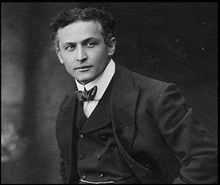
Back Harry Houdini Afrikaans Harry Houdini AN هاري هوديني Arabic هارى هودينى ARZ হেৰী হোডিনি Assamese Harry Houdini AST Harri Hudini Azerbaijani Гарри Гудини Bashkir Гары Гудзіні Byelorussian Хари Худини Bulgarian
Harry Houdini | |
|---|---|
 Houdini in 1907 | |
| Born | Erik Weisz March 24, 1874 |
| Died | October 31, 1926 (aged 52) Detroit, Michigan, U.S. |
| Cause of death | Peritonitis[1] |
| Resting place | Machpelah Cemetery |
| Occupations | |
| Years active | 1891–1926 |
| Height | 5 ft 6 in (168 cm) |
| Spouse | [2] |
| Relatives | Theodore Hardeen (brother) |
| Signature | |
Erik Weisz (March 24, 1874 – October 31, 1926), known professionaly as Harry Houdini (/huːˈdiːni/ hoo-DEE-nee), was a Hungarian-American escapologist, illusionist, and stunt performer noted for his escape acts.[3]
Houdini first attracted notice in vaudeville in the United States and then as Harry "Handcuff" Houdini on a tour of Europe, where he challenged police forces to keep him locked up. Soon he extended his repertoire to include chains, ropes slung from skyscrapers, straitjackets under water, and having to escape from and hold his breath inside a sealed milk can with water in it.
In 1904, thousands watched as Houdini tried to escape from special handcuffs commissioned by London's Daily Mirror, keeping them in suspense for an hour. Another stunt saw him buried alive and only just able to claw himself to the surface, emerging in a state of near-breakdown. While many suspected that these escapes were faked, Houdini presented himself as the scourge of fake spiritualists, pursuing a personal crusade to expose their fraudulent methods. As president of the Society of American Magicians, he was keen to uphold professional standards and expose fraudulent artists. He was also quick to sue anyone who imitated his escape stunts.
Houdini made several movies but quit acting when it failed to bring in money. He was also a keen aviator and became the first man to fly a powered aircraft in Australia.[4]
- ^ Schiller, Gerald. (2010). It Happened in Hollywood: Remarkable Events That Shaped History. Globe Pequot Press. p. 34. ISBN 978-0762754496
- ^ "Harry Houdini". Encyclopædia Britannica. Retrieved March 24, 2014.
- ^ Houdini!, retrieved March 11, 2021
- ^ Maksel, Rebecca. "The Hunt for Houdini's Airplane". Air & Space Magazine. Retrieved August 4, 2021.